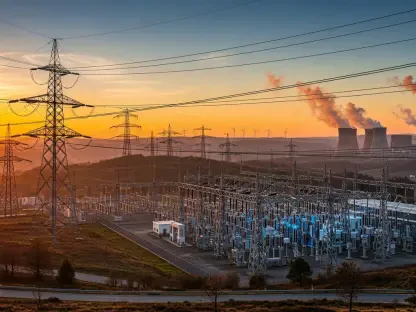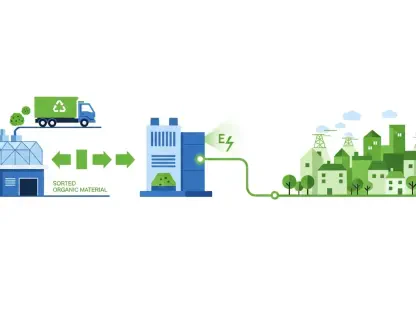In the fast-evolving landscape of industrial manufacturing, the demand for efficient and sustainable cooling solutions has never been more critical, especially as industries strive to balance productivity with environmental responsibility. Across sectors like food processing, pharmaceuticals, and heavy manufacturing, the challenge of maintaining optimal temperatures for processes while minimizing energy consumption and adhering to strict regulations looms large. Atlas Copco, a titan in industrial equipment innovation, has stepped up to address these pressing needs with a transformative expansion of its TCS chiller range. This strategic move not only broadens the scope of cooling capacities available but also embeds cutting-edge technology and sustainability at the core of its offerings. By pushing the boundaries of what industrial chillers can achieve, the company is setting a new benchmark for performance and responsibility in process cooling, paving the way for manufacturers to tackle modern challenges with confidence.
Advancing Cooling Technology for Diverse Needs
Expanding Capacity for Broader Applications
Atlas Copco has significantly widened the reach of its TCS chiller series to cater to an increasingly diverse set of industrial requirements. The latest models now cover cooling capacities ranging from 110 to 610 kW, a substantial leap from the original mid-range bracket. This expansion ensures that businesses of varying scales, from medium-sized operations to large industrial plants, can find a tailored solution for their process cooling needs. Such a broad spectrum of capacities allows the chillers to support critical applications across multiple sectors, ensuring consistent performance whether cooling machinery or maintaining precise temperatures for sensitive production processes. The company’s forward-looking approach also includes plans to introduce even larger models exceeding 1 MW by 2026, signaling a commitment to addressing high-capacity demands in the near future. This strategic growth in product offerings reflects a deep understanding of market dynamics and customer expectations in the industrial cooling arena.
Integrating Cutting-Edge Features for Performance
Beyond just expanding capacity, the TCS chiller range incorporates state-of-the-art technology to enhance operational efficiency. The integration of multi-scroll compressor technology paired with intelligent fan control logic stands out as a key innovation, delivering exceptional energy performance under real-world conditions. These advancements result in Seasonal Energy Performance Ratio (SEPR) values consistently surpassing 6, a metric that underscores significant energy savings and reduced operational costs for end-users. Additionally, the chillers are designed with compactness in mind, offering higher cooling output within a smaller footprint. This design choice proves invaluable for manufacturers working in space-constrained environments, allowing for optimized use of plant room or factory floor space. Such features demonstrate how Atlas Copco prioritizes not only performance but also practicality, ensuring that the TCS series meets the nuanced demands of modern industrial setups with precision and reliability.
Prioritizing Sustainability and Connectivity
Driving Environmental Responsibility with Innovation
A defining aspect of the TCS chiller range lies in its commitment to environmental stewardship, a critical concern as industries face tightening regulations on emissions and energy use. The adoption of R454B, a refrigerant with a low Global Warming Potential (GWP), marks a significant step toward sustainability. With a CO₂ equivalent impact five times lower than traditional alternatives like R410A, R454B ensures compliance with stringent F-Gas regulations in regions like the UK and EU, which aim to phase out high-GWP substances. This choice not only reduces the environmental footprint of industrial cooling but also future-proofs operations against evolving legislative frameworks. Furthermore, Atlas Copco supports customers with SEPR comparison tools to evaluate energy savings and greenhouse gas reductions, empowering informed decisions that align with both economic and ecological goals. This focus on green technology positions the TCS series as a leader in responsible industrial cooling solutions.
Enhancing Operations through Smart Connectivity
Equally impressive is the emphasis on digital integration within the TCS chiller lineup, which equips manufacturers with tools to optimize performance and uptime. Featuring the Elektronikon Mk5 controller and full compatibility with SMARTLINK remote monitoring, these chillers provide real-time data on performance metrics and energy efficiency. Operators gain access to predictive maintenance alerts, enabling proactive interventions that minimize downtime and extend equipment lifespan. This data-driven approach allows for precise control over operating costs, a vital consideration in competitive industrial environments. The connectivity features transform traditional cooling systems into intelligent assets, offering insights that drive continuous improvement in operational workflows. By embedding such advanced monitoring capabilities, Atlas Copco ensures that businesses can maintain peak efficiency while adapting to dynamic production demands, reinforcing the TCS range as a cornerstone of modern industrial infrastructure.
Reflecting on a Legacy of Innovation
Looking back, Atlas Copco’s journey in reshaping industrial cooling through the TCS chiller expansion showcases a remarkable blend of foresight and technical prowess. The broadened capacity range, coupled with high-efficiency standards and sustainable refrigerant choices, addresses immediate industry needs while setting a foundation for future advancements. The integration of smart connectivity further elevates the value delivered to manufacturers, ensuring that operational challenges are met with innovative solutions. As the company builds on this momentum, the planned introduction of larger models hints at even greater strides in meeting high-capacity cooling demands. For industries navigating the complexities of efficiency and environmental compliance, the path forward involves leveraging such pioneering technologies to enhance productivity sustainably. Exploring partnerships with forward-thinking equipment providers and staying abreast of regulatory shifts emerges as essential steps to maintain a competitive edge in an ever-evolving landscape.









